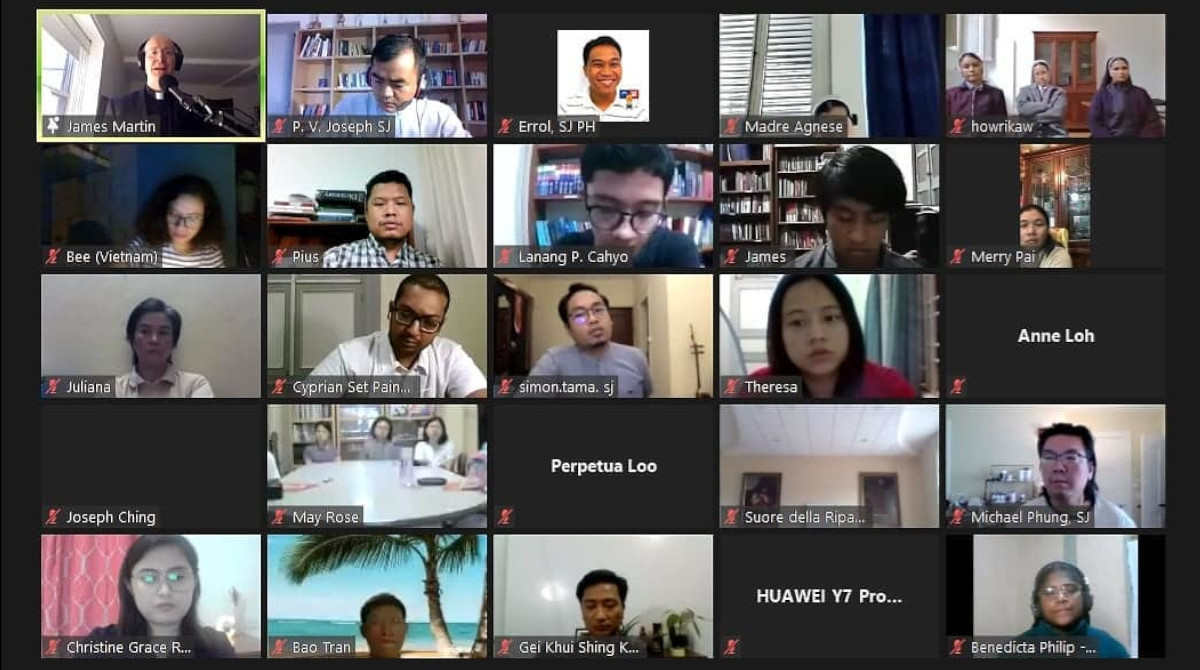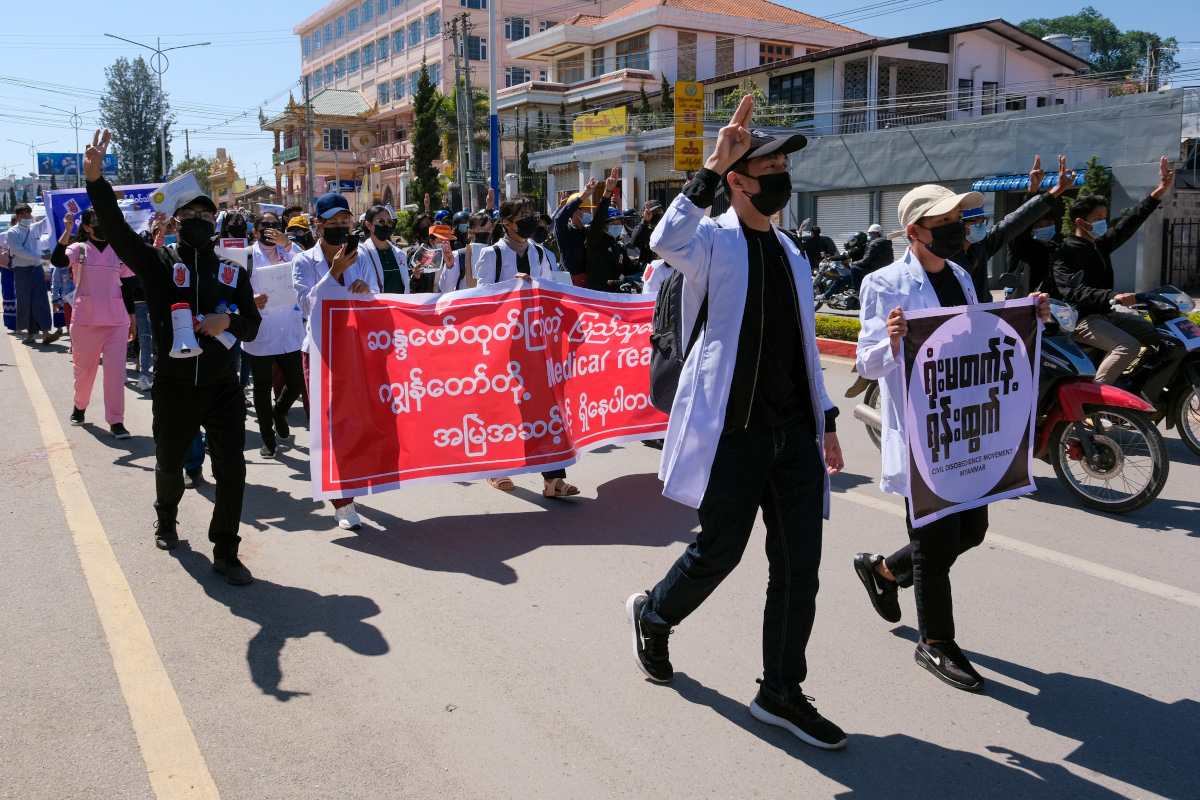 Members of Magis Myanmar and Myanmar Scholastics held an online dialogue on 6 March with American Jesuit Fr James Martin SJ to help provide comfort and spiritual clarity amid the continuous violence in Myanmar. Some 300 people, mostly youth, from Myanmar, the USA, the Philippines, Singapore, Vietnam, Indonesia, Cambodia, Malaysia, Thailand, Italy, France, Ukraine, and India gathered online to show their solidarity with the people of Myanmar.
Members of Magis Myanmar and Myanmar Scholastics held an online dialogue on 6 March with American Jesuit Fr James Martin SJ to help provide comfort and spiritual clarity amid the continuous violence in Myanmar. Some 300 people, mostly youth, from Myanmar, the USA, the Philippines, Singapore, Vietnam, Indonesia, Cambodia, Malaysia, Thailand, Italy, France, Ukraine, and India gathered online to show their solidarity with the people of Myanmar.
Fr Martin, who is a well-known writer, editor, public speaker, and activist, said he has been following the news and is always with Myanmar in prayer. Asked where God is at this moment of suffering, confusion, and uncertainty, he said: “Finding God in difficult times is very similar to the Jesuit motto, ‘Finding God in all things’. We have to ask ourselves: How do we find God in all things?” He gave three Ignatian Spirituality tools that can help in the discernment of this question.
First is Consciousness Examen, a prayer one can do at the end of every day. “When we are dealing with crises, suffering, death, oppression, injustice, and violence, God asks us to look for Him amid the daily events that happened… This prayer helps us see where God is,” said Fr Martin.
“Often in difficult times, we focus only on the difficulties and not where God might be. We are so caught up in the day-to-day events, and we miss where God is speaking to us,” he said. The Consciousness Examen gives one time to “notice where God is active” during the day, which is a massive part of Jesuit spirituality, “to be able to look back and see where God has been beneficial” to overcome difficulties and challenges, especially now in Myanmar.
The second Ignatian Spirituality tool is Discernment of Spirits, the “insight that not only does God want us to make good decisions, but God will also help us make good decisions,” said Fr Martin. It is filtering which thoughts or instances give good or bad feelings. Anything that gives one more hope, confidence, courage, and a sense of uplift is coming from God. And anything that says, “nothing can change, that everything is hopeless that leads you to despair is not coming from God”.
The third spiritual tool is Ignatian Contemplation, which enables one to meet God in a very personal way. It is using one’s imagination to place oneself within a scripture scene or to imagine speaking with God. It is an “invitation to trust that Jesus will calm the waves” in our lives by imagining how He has conquered difficulties before in scripture.
In this season of Lent, Fr Martin also made the connection between the experience of the people of Myanmar and Jesus’ own experience of opposition and suffering. He assured them: “Remember when we pray to Jesus in this situation in your country, we are praying to someone who understands these things. Not only because He is divine… But because He is human and experienced all these things… You are praying to someone who experienced injustice and oppression under the hands of the military.”
The desire to work for justice, peace, and reconciliation comes from God himself. “How else would God effect change in the world other than by moving our hearts?” he said, encouraging his audience to “trust our desire for justice” and that “we are called to work actively for justice and for peace”.

Many of the young participants from Myanmar raised very insightful questions during the open forum, being concerned about the situation in their country and how to stay faithful and calm amidst the violence and brutality of the military junta. The following are the questions that were asked and the answers of Fr Martin:
What are good strategies Jesus teaches in reacting to the situation in Myanmar?
In the fight for justice, exposing evil and speaking the truth is very important. We always should work for peace and reconciliation, but part of that is truth-telling… Jesus points out sin. But we have to do it without hating other people. The sacrament of reconciliation will show the way forward.
How can I handle feeling depressed because I cannot participate in the CDM (Civil Disobedience Movement), and how can I support my detained friends?
First of all, I’m sorry for your pain, and I’m sorry about your friends. One thing to remember is that we are all called to be holy and participate in injustice in our own way. Even if you cannot participate in the demonstrations, you can be called to participate in your own way. We can’t all be activists, and we can’t all be on the frontlines… God has given you a particular task. It might be supporting your friends and praying for them… Your call is to do your own thing. That doesn’t mean that what you do is better or worse than everybody else… As for your friends in detention, pray for them, keep in touch, and help them however you can. In your prayers, express to God your honesty and frustration.
Despite the military’s daily brutality, how, as Christians, do we stay calm and positive in this situation?
It’s natural to be emotional. The first thing to say to yourself in situations like these is that it’s natural, and not to be upset and angry with yourself for being angry… One of the keys is being honest with your frustrations in prayer… Jesus gets angry… You can be mad at a situation and the injustice… You can still find a place of peace from the decisions that you have made. You can stay calm when doing discernment of spirits. The evil spirit can confuse us and distract us. The good spirit is the spirit of peace and clarity. Your emotions are nothing to be ashamed of. Find clarity and sureness about your path. The other thing to remember is, you may be feeling God’s anger. How can God work through us to arise in us the sense of injustice?
How can we participate and be one with the people if we cannot go out with them as religious people?
In general, the church should always resist aligning itself with one political party. So, you can discern the best things for you to do: “How can I be creative in helping other people?” Trust your conscience to tell you what you can do. If you know people participating in the demonstrations, trust that God placed you where you are, have the mind and conscience to come up with ways to be creative on how to help.
How can we reconcile these two feelings of wanting peace and wanting to fight?
Jesus is always our model. Jesus is always opposing violence in His own way, by standing up, by speaking up, but He is never violent Himself. It is a detailed message… We try in every way that we can to peacefully respond to violence… Always by looking at Jesus and His response. His life is not about avoiding violence. He confronts violence with love. Always with love. It’s wrong to say that we just have to accept violence and be passive. He is constantly calling out injustice. It’s up to you to discern the model [of Jesus] in your own life. His model is to be clear about the injustice but not to participate in violence.
How do you keep the balance when you are overwhelmed? I have been accompanying this group of Generation Z, and one of them was shot, and I found myself feeling very overwhelmed and could hardly find time to rest.
Sorry to hear about your pain and your friend being shot… It sounds like you are obedient to your conscience. The first thing is to trust that your conscience will help you make sound and healthy decisions. The second thing about feeling overwhelmed is to express your emotions to God. That will help unburden us. The most important thing is to remember you can’t do everything in life. You can’t take care of everyone. [Offer] your own powerlessness and humility before God… Our feeling of being overwhelmed is because we try to do everything. Just do your best. And remember the need for self-care… Jesus took care of the person in front of Him and not everyone at the same time. Let go of the need to do everything.
How do I encourage my brother, who wants me to pray for MAL [General Min Aung Hlaing, the military junta leader] to die?
Don’t pray for evil to happen to somebody. Separate that desire to harm your enemies from your willingness to help people… You help your brother by doing your best to encourage him, listening to him, loving him, and remembering that you may not be able to change his mind, and that’s okay.
Is it possible that God refuses our painful and shameful stories?
I don’t think God refuses anything that we offer Him that is sincere. If you’re wondering if God hears your anger, your frustrations, I believe God hears all of those things. He is constantly meeting people who are in painful situations. I would never doubt that God hears your pain.
If we are afraid to witness to the truth, is it wrong to remain silent on injustice?
It is natural to be afraid if you are in a difficult situation. But Jesus is always inviting us beyond that fear. One thing you can do is not allowing fear to influence your decisions. You can have that fear inside, but when you are making a decision, do not let anxiety affect your decision. You can say that I decide to do this for the reason of hope or courage or confidence in Jesus, even though I might have that interior feeling of fear.

Christine Grace Ruta is a graduate of Ateneo de Davao University in the Philippines. She served as a volunteer teacher at St Aloysius Gonzaga Institute of Higher Studies in Taunggyi, Myanmar during school year 2017-2018.

